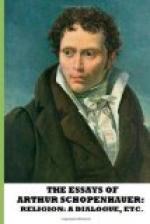This tendency became bankrupt when, under Winkelman’s direction, a return was made to the antique school. The history of painting furnishes an illustration in the first quarter of the century, when art was looked upon merely as a means and instrument of mediaeval religious sentiment, and its themes consequently drawn from ecclesiastical subjects alone: these, however, were treated by painters who had none of the true earnestness of faith, and in their delusion they followed Francesco Francia, Pietro Perugino, Angelico da Fiesole and others like them, rating them higher even than the really great masters who followed. It was in view of this terror, and because in poetry an analogous aim had at the same time found favor, that Goethe wrote his parable Pfaffenspiel. This school, too, got the reputation of being whimsical, became bankrupt, and was followed by a return to nature, which proclaimed itself in genre pictures and scenes of life of every kind, even though it now and then strayed into what was vulgar.
The progress of the human mind in literature is similar. The history of literature is for the most part like the catalogue of a museum of deformities; the spirit in which they keep best is pigskin. The few creatures that have been born in goodly shape need not be looked for there. They are still alive, and are everywhere to be met with in the world, immortal, and with their years ever green. They alone form what I have called real literature; the history of which, poor as it is in persons, we learn from our youth up out of the mouths of all educated people, before compilations recount it for us.
As an antidote to the prevailing monomania for reading literary histories, in order to be able to chatter about everything, without having any real knowledge at all, let me refer to a passage in Lichtenberg’s works (vol. II., p. 302), which is well worth perusal.
I believe that the over-minute acquaintance with the history of science and learning, which is such a prevalent feature of our day, is very prejudicial to the advance of knowledge itself. There is pleasure in following up this history; but as a matter of fact, it leaves the mind, not empty indeed, but without any power of its own, just because it makes it so full. Whoever has felt the desire, not to fill up his mind, but to strengthen it, to develop his faculties and aptitudes, and generally, to enlarge his powers, will have found that there is nothing so weakening as intercourse with a so-called litterateur, on a matter of knowledge on which he has not thought at all, though he knows a thousand little facts appertaining to its history and literature. It is like reading a cookery-book when you are hungry. I believe that so-called literary history will never thrive amongst thoughtful people, who are conscious of their own worth and the worth of real knowledge. These people are more given to employing their own reason than to troubling




